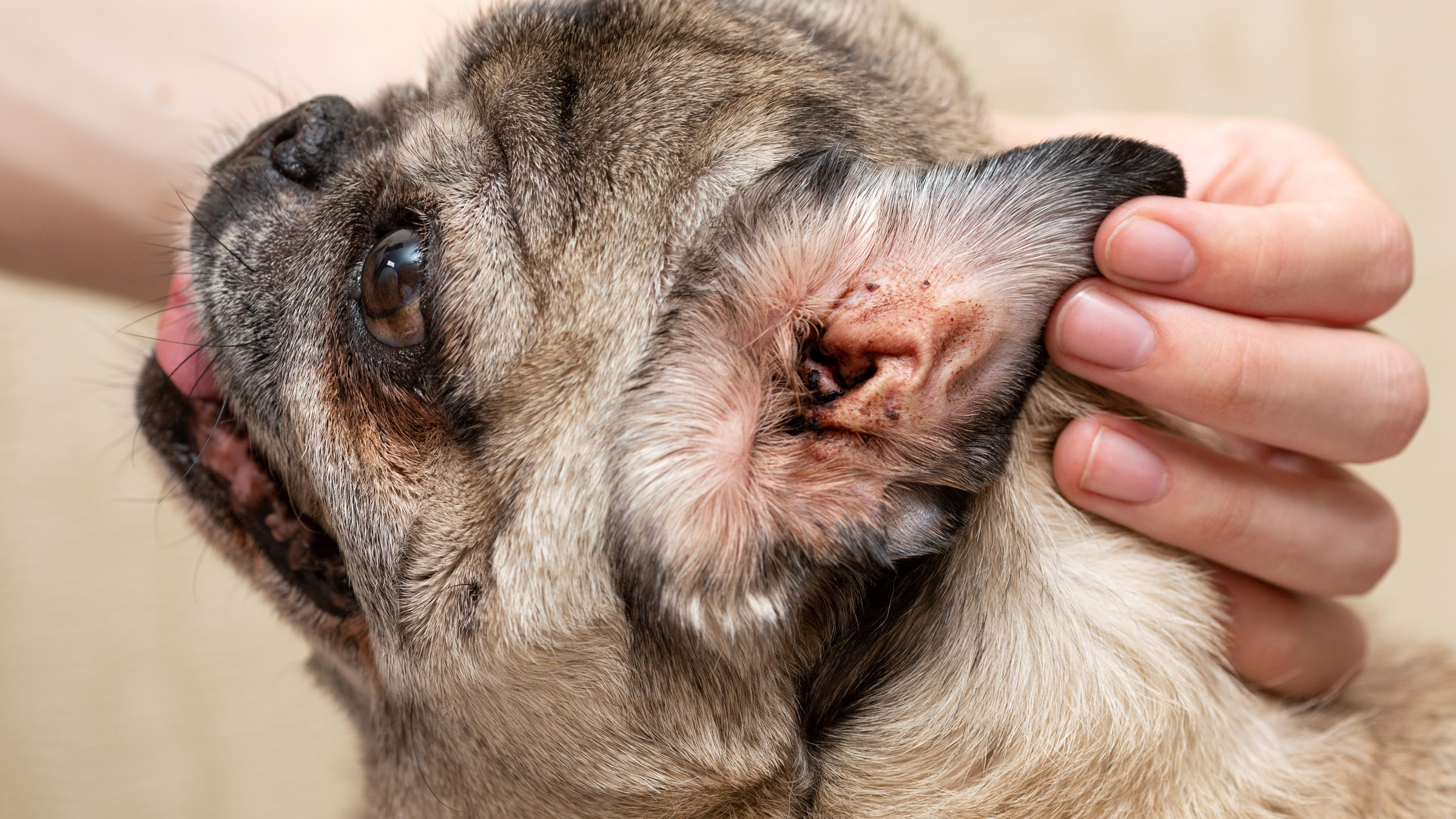If your dog keeps shaking his head, it could be due to allergies, foreign objects in the ear, or nasal disease. A veterinarian can provide an accurate diagnosis and appropriate treatment plan.
Causes Of Head Shaking In Dogs
If your dog shakes his head frequently, it could be a sign of underlying issues such as allergies, foreign objects in the ear, or nasal disease. It’s best to consult a vet for an accurate diagnosis and proper treatment plan.
1. Ear Infections
Dogs are prone to ear infections due to their larger ear canals and floppy ears. Ear infections can be caused by bacteria, yeast, mites, or allergies. When a dog has an ear infection, they may shake their head vigorously to relieve the discomfort and itchiness.
Common symptoms of an ear infection include redness, swelling, a foul odor, discharge, and excessive scratching. It’s important to have your dog’s ears checked by a veterinarian who can prescribe the appropriate treatment, such as antibiotics, ear drops, or ear wash.
2. Allergies And Irritations
Allergies can cause dogs to shake their heads as a way to relieve itchiness and discomfort. Environmental allergens like pollen, dust mites, or mold spores can trigger allergic reactions in dogs. They can also be allergic to certain foods or ingredients in their diet.
Irritants, such as chemicals or foreign objects, can also cause dogs to shake their heads. For example, if water gets trapped in their ears while swimming, it can cause irritation and shaking. It’s important to identify and remove the allergens or irritants to alleviate the head shaking.
3. Underlying Health Conditions
In addition to ear infections and allergies, there are several underlying health conditions that can cause dogs to shake their heads. These conditions may include:
- Ear hematomas: This occurs when blood vessels in the ear break, causing a pocket of blood to accumulate. It can be caused by trauma, ear infections, or excessive head shaking.
- Foreign objects: Dogs may shake their heads to try and dislodge foreign objects, such as grass seeds or insects, that have entered their ears.
- Tumors or polyps: Growths in the ear canal can cause discomfort and lead to head shaking.
- Dental problems: Dental issues can radiate pain to the head and ears, causing dogs to shake their heads.
- Neurological disorders: In rare cases, neurological conditions like idiopathic head tremors can cause dogs to shake their heads involuntarily.
If your dog is shaking their head excessively, it’s important to consult with a veterinarian for a proper diagnosis. They can perform a thorough examination and recommend appropriate treatment options based on the underlying cause.

Credit: www.akc.org
Solutions For Head Shaking In Dogs
If you’re wondering why your dog shakes his head so much, it could be due to allergies, foreign objects in the ear, or even nasal disease. Consulting a veterinarian is crucial for an accurate diagnosis and appropriate treatment plan.
If your dog’s head shaking is caused by an ear infection, it is crucial to address the underlying issue. Consulting a veterinarian is essential for an accurate diagnosis and appropriate treatment plan. Some possible treatments for ear infections in dogs include:
- Prescription antibiotics or anti-inflammatory tablets
- Topical ear drops or medication
- Ear wash or flush
- Ear mite treatment
- Dietary changes to support immune system health
- In some cases, anesthetic cleaning of the ear canal may be necessary
- Surgical intervention may be required in severe cases
Allergies and irritations can also cause dogs to shake their heads frequently. Identifying and addressing the source of allergies or irritations can provide relief for your furry friend. Here are some strategies to manage allergies and irritations in dogs:
- Avoidance of allergen triggers if possible
- Regular bathing and grooming to remove allergens from the coat and skin
- Use of hypoallergenic pet products
- Prescription medications such as antihistamines or corticosteroids
- Switching to a hypoallergenic or limited ingredient diet
- Allergy testing and immunotherapy (allergy shots) for long-term management
If your dog continues to shake their head despite the absence of ear infections or allergies, it might be necessary to investigate other underlying health conditions. Consulting a veterinarian is crucial in determining the cause and developing an appropriate treatment plan. Some potential underlying health conditions that could contribute to head shaking in dogs are:
- Foreign objects lodged in the ear
- Nasal disease
- Neurological disorders
- Dental issues
- Oral infections
- Thyroid or hormonal imbalances
- Tumors or growths
When To Consult A Veterinarian
If your dog is frequently shaking his head, it is important to monitor his behavior and symptoms. While occasional head shaking can be normal, persistent or excessive head shaking may indicate an underlying issue that requires veterinary attention. There are several factors to consider when deciding whether to consult a veterinarian.
Persistent Head Shaking
If your dog’s head shaking persists for an extended period, it could be a sign of an underlying problem. Persistent head shaking may be indicative of ear infections, allergies, foreign objects in the ear, or even nasal disease. It is crucial to consult a veterinarian for a proper diagnosis and appropriate treatment plan.
Presence Of Other Symptoms
In addition to head shaking, pay attention to any other unusual symptoms your dog may be experiencing. These symptoms can include but are not limited to:
- Scratching or pawing at the ears
- Redness or swelling in the ear canal
- Discharge or foul odor from the ears
- Changes in appetite or behavior
- Loss of balance or coordination
If your dog exhibits any of these symptoms alongside head shaking, it is essential to consult a veterinarian to determine the underlying cause and provide appropriate treatment.
Failure To Respond To Home Remedies
If you have tried home remedies such as cleaning your dog’s ears with specialized solutions or adjusting his diet to alleviate allergies, but his head shaking persists or worsens, it is recommended to seek veterinary advice. A veterinarian will be able to assess the situation more thoroughly and offer specific treatments that target the underlying cause of the head shaking.
Remember, the health and well-being of your dog should always be a priority. If you are unsure whether to consult a veterinarian, it is always better to err on the side of caution and seek professional advice.

Credit: www.goodrx.com

Credit: pethelpful.com
Frequently Asked Questions On Why Does My Dog Shake His Head So Much
What Should I Do If My Dog Keeps Shaking His Head?
If your dog keeps shaking his head, it could be due to allergies, foreign objects in the ear, or nasal disease. Consult a veterinarian for an accurate diagnosis and treatment plan. Avoid self-medication and seek professional assistance for your dog’s well-being.
What Can You Do For A Dog With A Shaking Ear?
If your dog keeps shaking its head, it’s important to consult a veterinarian for an accurate diagnosis and treatment plan. There may be underlying issues such as allergies, foreign objects in the ear, or nasal disease. The veterinarian can prescribe antibiotics, ear drops, or perform a thorough ear cleaning.
Surgery may be required in some cases.
Why Does My Dog Shake His Head A Lot Anxiety?
If your dog shakes his head a lot, it could be due to anxiety or other underlying issues. It’s important to consult a veterinarian for an accurate diagnosis and treatment plan. Shaking may be a normal reaction for dogs to calm themselves after tense or stressful situations.
Check for other symptoms like discharge or odor to determine if there is an ear infection.
How Do I Know If My Dog Has An Ear Infection?
If your dog is shaking his head, it could be a sign of an ear infection. Look for symptoms like scratching, discharge, odor, redness, swelling, crusts, hair loss, rubbing, and head shaking or tilt. Consult a veterinarian for proper diagnosis and treatment.
Conclusion
If your dog keeps shaking his head, it’s crucial to identify the underlying cause. While it could be an ear infection, there may be other issues at play, such as allergies or foreign objects lodged in the ear. Consulting a veterinarian is the best course of action for an accurate diagnosis and appropriate treatment plan.
With the right care and attention, you can help your furry friend find relief from excessive head shaking.



